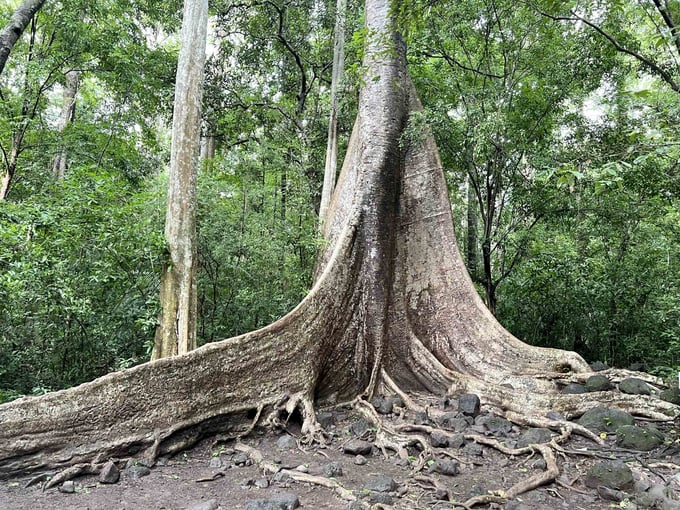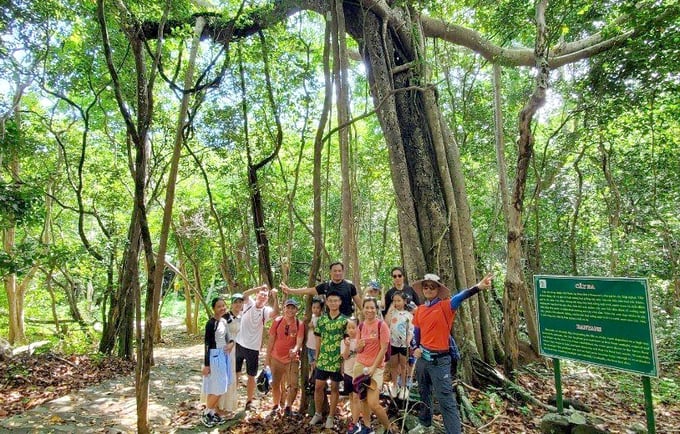May 21, 2025 | 03:45 GMT +7
May 21, 2025 | 03:45 GMT +7
Hotline: 0913.378.918
May 21, 2025 | 03:45 GMT +7
Hotline: 0913.378.918

An ancient tree in Cat Tien National Park. Photo: Son Trang.
Ms. Vo Thi Bich Thuy, Business Director of Tam An Group, is an entrepreneur with extensive experience in ecotourism. She believes that Cat Tien National Park has substantial potential for ecotourism development. The park's location, which is situated between two major tourist centers—Ho Chi Minh City and Da Lat—makes it simple to attract visitors from Da Lat or Ho Chi Minh City, particularly on weekends, in addition to its valuable natural resources.
Nevertheless, to effectively promote ecotourism in Cat Tien National Park, it is imperative to employ innovative and practical strategies.
For example, Tam Anh Group will evaluate "push" and "pull" factors when developing ecotourism excursions to Cat Tien National Park. "Pull" factors are the factors that will entice visitors to Cat Tien National Park at that particular time. Tourists' motivations to depart their residences in search of novel experiences are called "push" factors. When these two streams of information intersect, ecotourism professionals can create and improve tourism products that cater to visitors' unique requirements.
To fully capitalize on the immense natural potential of national parks and reserves, such as Cat Tien National Park, the development of ecotourism tours necessitates the application of creativity to provide visitors with various products within the same route and space.

Tourists participating in ecotourism at a reserve. Photo: Tran Phi.
Integrating teachings regarding the conservation of natural resources and forests is a critical component of ecotourism. When designing these lessons, the age categories of various tourist groups should be taken into account. It is also necessary to employ creativity to facilitate tourists' comprehension and retention of this information.
For instance, if the guide simply instructs tourists not to pick this leaf or capture that fish while leading them into the forest, it may cause many to feel uneasy and question the purpose of participating in a tour that is characterized by a multitude of restrictions.
Alternatively, the guide may inform travelers that the leaf they are about to remove is a food source for a herbivorous animal. In turn, this animal serves as a sustenance source for specific predators. Therefore, the natural food chain is inadvertently disrupted when forest leaves are removed. Tourists will comprehend the rationale behind refraining from arbitrary leaf plucking or fish catching during their visits to national parks and reserves with the assistance of this explanation. Consequently, tourists will experience a sense of pride in their contribution to the conservation of nature and biodiversity by refraining from causing damage to forest resources.
Tam Anh Group recently recommended that guides introduce lessons on forest and natural resource conservation in the manner described above during the organization of an ecotourism program at Bidoup – Nui Ba National Park. This suggestion was well-received by tourists.
To accommodate tourists' diverse ecotourism requirements, Ms. Thuy believes that Cat Tiên National Park and nearby national parks and reserves, including Bidoup—Nui Ba and Nui Chua, can establish a circular route that will alternately welcome tourists throughout the year and share the tourist market with Ho Chi Minh City, Nha Trang, Da Nang, Da Lat, and other locations.
Translated by Linh Linh

(VAN) In 2024, over 295 million people across 53 countries and territories faced acute hunger—an increase of almost 14 million people compared to 2023, while the number of people facing catastrophic levels of hunger reached a record high.

(VAN) World Environment Day 2025 (June 5) carries the theme 'Beat Plastic Pollution' continuing to emphasize the global urgency of addressing the plastic waste crisis.

(VAN) This was the assessment shared by experts at the workshop titled 'Assessing the Role and Potential of Low-Emission Rice Production Systems in Vietnam,' held on the morning of May 19.

(VAN) Cai Rong Port is the fisheries control center of Quang Ninh, helping to monitor fishing vessels, combat IUU fishing, and remove the EC's 'yellow card'.

(VAN) The German Agricultural Society (DLG) explores the possibility of establishing a mechanization service center in Vietnam’s Mekong Delta to support farmers in accessing and utilizing advanced machinery.

(VAN) On May 16, the Department of Water Resources Management, in collaboration with the Food and Agriculture Organization of the United Nations (FAO), held a signing ceremony for the GEF-8 project document.

(VAN) Food safety, mechanization, vocational training, and market opening are key areas of cooperation expected between the Vietnamese Government and the Federal Republic of Germany.